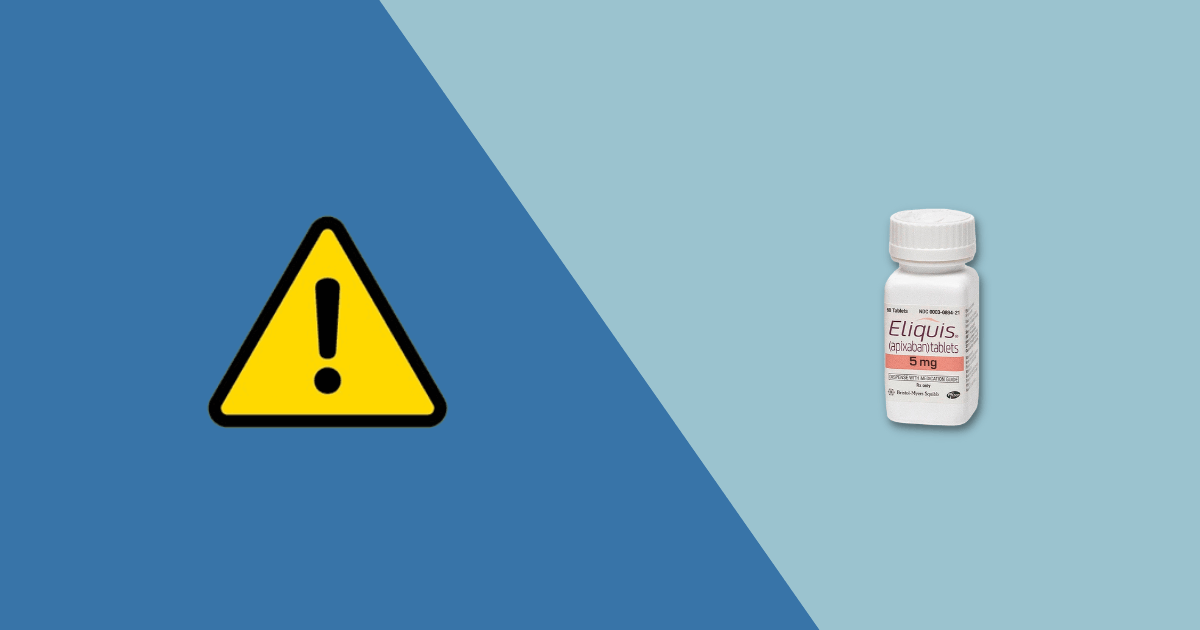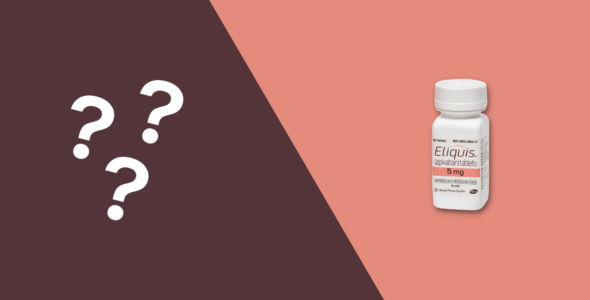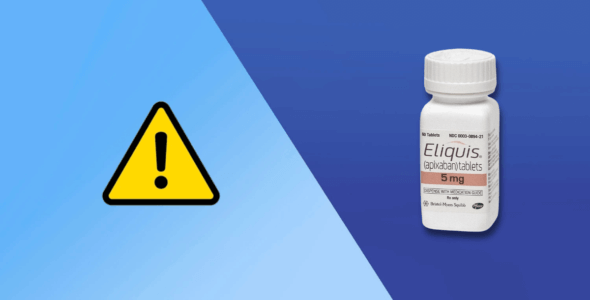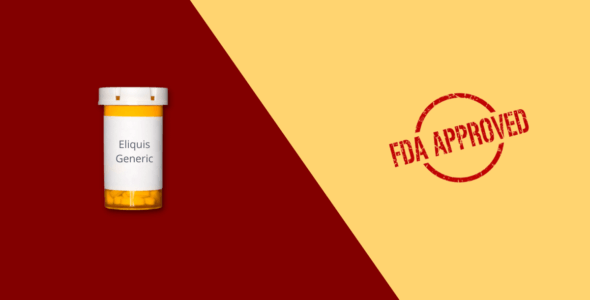Side effects of Eliquis in the elderly
Table of contents
Eliquis is a brand-name medication manufactured by Bristol-Myers Squibb. It is an anticoagulant used to prevent blood clots from forming in the body. While Eliquis is generally well tolerated, there are some potential side effects that people should be aware of. The most common side effects of Eliquis include an increased risk of bleeding and bruising. Less common, but more serious side effects, can include allergic reactions.
Learn more about the side effects of Eliquis in the elderly and what you can do to avoid them.
What is Eliquis (apixaban)?
Eliquis is an anticoagulant, a type of drug that stops blood clotting. The medication is used to prevent blood clots from forming in people who have:
- Nonvalvular atrial fibrillation (an irregular heartbeat not caused by a heart valve problem) and who have other clotting risk factors
- Had hip or knee replacement surgery
It’s also used to treat blood clots in your legs (deep vein thrombosis) and lungs (pulmonary embolism), and to stop blood clots from reoccurring in these places.
Blood clotting is a normal process that happens when you’re injured. If you cut yourself, a clot forms to seal the cut to stop you from losing any more blood. But sometimes blood can clot inside your body where it shouldn’t, and this can cause problems. Clots can block the flow of blood, starving parts of the body of oxygen, and damaging tissues. Depending on where blood clots form, they can cause deep vein thrombosis, heart attacks, and strokes. Sometimes Eliquis is called a blood thinner, as it helps to lower the chances of blood clots forming.
The active ingredient in Eliquis is an anticoagulant called apixaban. As blood clots, it goes through a process of chemical reactions that turn it from a liquid into a thick gel. An enzyme called factor Xa is an important part of this process. Apixaban is a factor Xa inhibitor and attaches to factor Xa to stop it from working, reducing the likelihood of blood clots forming.
RELATED: What is Eliquis
Eliquis dosage
Eliquis is available in tablet form, in the following doses: 2.5 mg and 5 mg.
The recommended dose of Eliquis is 5 mg orally twice daily. For elderly patients 80 years of age or older, weighing 60 kg or less, or having serum creatinine equal to or above 1.5 mg/dL, the recommended dose is 2.5 mg orally twice daily.
If you are unable to swallow the tablets whole, you may crush them and mix with water, apple juice, or applesauce and taken orally. Crushed tablets may also be mixed with 60 mL of water and given through a nasogastric tube.
If you take heparin, warfarin, Coumadin, or Jantoven, your doctor will give you instructions about how to switch to apixaban. You do not need to monitor your Vitamin K intake while taking Eliquis. If you miss a dose, take it as soon as you remember. If it is almost time for your next dose, skip the missed dose and take your next dose at the normal time.
You are advised to read the medication guide provided with this medicine for the full drug information, and always speak with a healthcare professional for medical advice about any changes to your dose so they can monitor and evaluate your condition.
RELATED: Eliquis Dosage
Why are blood thinners prescribed to the elderly?
Older adults may be more likely to have medical conditions needing them to use blood thinners. Conditions may include:
- Nonvalvular atrial fibrillation – causes disruption to the flow of blood and increases the risk of blood clots
- Deep vein thrombosis (DVT) – blood clots occur deep within a vein, most commonly in a thigh or lower leg
- Pulmonary embolism – when a DVT blood clot breaks free from where it initially formed and travels along to the pulmonary arteries in the lungs. Symptoms may include chest pain, and difficulty breathing
- Coronary artery disease – arteries in the heart become narrowed or blocked entirely
- Peripheral artery disease – arteries in the head, arms, and legs become narrowed
- Elderly patients requiring knee or hip surgery are more likely to develop blood clots after surgery
What are the side effects of Eliquis in the elderly?
The most common side effects of Eliquis in clinical trials include:
- Increased bleeding risk – anemia, increased bruising, bloody or brown urine or bloody or tarry stools, bleeding from your anus or vagina, vomiting blood or what appears to look like dark coffee grounds, unusual nosebleeds
- Headache, dizziness, weakness, pain, swelling, or discomfort in a joint
- Pinpoint red spots on your skin
Eliquis can cause more serious side effects, including:
- Serious, potentially fatal bleeding
- Hypersensitivity reactions including anaphylactic allergic reactions. This is a medical emergency. Call your doctor right away if you develop a skin rash, itching, trouble breathing, difficulty swallowing, or any swelling of your hands, face, or mouth
- Thrombocytopenia (including platelet count decreases)
- Hypotension
- Epistaxis
- Gastrointestinal hemorrhage (bleeding)
- Abnormal liver function tests
- Incision-site hematoma
If you experience any serious side effects, stop taking Eliquis and seek medical attention immediately. You are encouraged to report negative side effects of prescription drugs to the FDA. Visit www.fda.gov/medwatch, or call 1-800-FDA-1088.
Eliquis drug interactions
Elderly patients usually take medicines for other medical conditions and will require close monitoring. Eliquis can interact with other medications including:
- Antifungal medicines – ketoconazole, voriconazole
- Other drugs used to prevent blood clotting – dabigatran, rivaroxaban (Xarelto)
- Antiplatelets – clopidogrel
- Oral anticoagulants – warfarin
- NSAIDs (nonsteroidal anti-inflammatory drugs) – diclofenac, ibuprofen, meloxicam
- Medicines for high blood pressure or heart problems – amlodipine, felodipine
- Antidepressants – citalopram, escitalopram, fluoxetine
- Treatments for seizures – carbamazepine, phenobarbital, phenytoin
- St John’s Wort
Before taking Eliquis, be sure to tell your doctor about all of the medications you are taking to ensure they are safe to take at the same time.
Eliquis warnings & precautions
Don’t take Eliquis if you:
- Are allergic to the active ingredient apixaban
- Are allergic to any of the other ingredients found in Eliquis
- Have artificial heart valves
- Have antiphospholipid syndrome (APS), especially with positive triple antibody testing, and have a history of blood clots
- Are under 18 years of age
- Are bleeding excessively
- Have an organ condition that increases the likelihood of serious internal bleeding, like a stomach ulcer
Talk to your doctor before taking Eliquis if you:
- Have an increased risk of bleeding, such as a bleeding disorder or very high blood pressure
- Are over 75 years of age
- Weigh 60kg or less
- Have a severe kidney disease or are on dialysis
- Have a liver problem or a history of liver problems
- Have antiphospholipid syndrome
- Are lactose intolerant
- Need to have surgery or another procedure that can cause bleeding
- You are pregnant or breastfeeding
You should always check with your doctor or pharmacist before taking any medication, including Eliquis, to make sure it is safe for you.
Other warnings you should know about
- Eliquis may need to be temporarily stopped a few days before surgery of any sort, including dental procedures
- Speak to your doctor before you stop using this medicine. There may be a higher risk of stroke if you stop using this medicine suddenly.
- Grapefruit juice may increase the amount of Eliquis in your body. Talk with your health care provider or pharmacist if grapefruit is part of your diet
- Eliquis may increase the risk of blood clots in the epidural area or spine. The risk of this occurring increases if an epidural catheter has been previously placed in your back prior to treatment with Eliquis, if NSAIDs or anticoagulants are being taken, if you have previously had punctures in the epidural area or any other issues with your spine, or if you have had surgery in the past on your spine. Symptoms may include a tingling sensation, feeling numb, or muscle weakness, specifically in your feet or legs.
How to avoid Eliquis side effects in the elderly
The best way to avoid side effects is to take Eliquis as directed by your doctor. Follow your doctor’s instructions carefully and do not take more or less than prescribed.
If you experience any side effects, talk to your doctor or pharmacist. They may be able to recommend ways to help reduce or prevent some of the side effects.
1. Stick to the recommended dosage
Take your prescribed dose of Eliquis that has been recommended by your healthcare professional. Do not take more or less than prescribed.
2. Know the signs and symptoms of Eliquis side effects
Signs and symptoms of side effects include an increased risk of bleeding and bruising. If you experience any of these symptoms call your doctor for medical advice.
3. Tell your doctor about all medications you’re taking
Be sure to tell your doctor about all other medications you’re taking, including over-the-counter drugs, vitamins, and herbal supplements, as they can interact with Eliquis.
4. Get regular medical check ups
If you have side effects it is important to get regular medical check ups and monitor your medical conditions. Your doctor will monitor your side effects and may adjust your dose of Eliquis as needed.
Medically reviewed
A medical professional has reviewed this article.


Jamie Winn, PharmD
Jamie Winn, PharmD
Dr. Jamie Winn received his Doctor of Pharmacy in 2002 from the University of South Carolina College of Pharmacy, Columbia, SC. Jamie is a medical reviewer for NiceRx.




